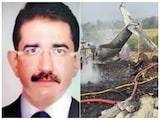In an unprecedented move, the Centre on Friday removed Border Security Force (BSF) Director General Nitin Agrawal and his deputy Special DG (West) YB Khurania and sent them back to their state cadres "with immediate effect", according to a government order.
Mr Agrawal is a 1989-batch Kerala cadre officer, while Mr Khurania belongs to the 1990-batch of the Odisha cadre. Mr Agrawal had taken charge as BSF chief in June last year. Mr Khurania, as the special DG (West), was heading the formation of the force along the Pakistan border.
Separate orders issued by the Appointments Committee of the Cabinet said they were being "prematurely" repatriated with "immediate effect."
Constant infiltration from the International Border is one of the factors behind the Centre's move, sources said. There have been complaints against the BSF chief over critical matters including alleged lack of coordination, sources said.
"Lack of command and control within the force and lack of coordination with other sister agencies led to his repatriation," a senior officer said, requesting anonymity.
"Premature repatriation to the cadre of two very senior officers is definitely a strong message from the government to the forces to get their act together," the officer said. "In light of heightened actions in south of Pir Panjal, of which the BSF holds a chunk of the International Boundary, the buck stops with the DG and Special DG BSF," the officer added.
This is for the first time that heads have rolled in terror related cases. Even after the Pulwama attack in 2019, no known accountability was fixed by the Home Ministry.
The BSF has some 2.65 lakh personnel and guards the borders with Pakistan in the west and Bangladesh in the east.
The government's move comes amid its decision to roll out a new security matrix for Jammu and Kashmir to counter targeting of civilians and military personnel and camps by terrorists in recent weeks and months, including an attack on an army camp in Rajouri last week, in which one soldier was injured.
In fact, in the past two months, attacks and ambushes have become regular events, particularly in the southern reaches of Pir Panjal, an area in which the spectre of terrorism had lain dormant for a long time. Among recent scares there was an operation in which two army officers were killed and two Pakistani terrorists, one of them a Lashkar-e-Taiba sniper and explosives expert, eliminated.















